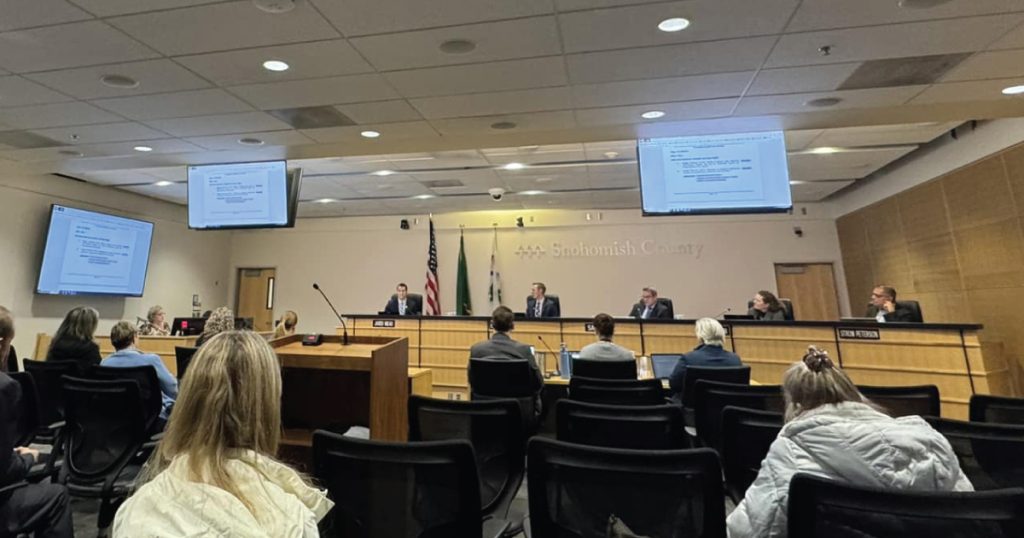SNOHOMISH COUNTY—After months and careful deliberation, the Snohomish County Council adopted its first biennial Budget during a Public Hearing Monday, November 25—a $3.22 billion operating budget for the upcoming 2025 and 2026 fiscal years.


“As the Chair of the Council, I am so proud of my fellow Councilmembers who all deliberated both passionately and respectfully with one another. We heard hours of public testimony and considered well over 30 amendments when all was said and done,” Council President Jared Mead wrote on Facebook shortly after passage of the budget. “Thank you to everyone who wrote in or testified over the past couple of months. Your voices were heard and absolutely critical during this process.”
While the county has operated under a biennium budget in the past, it says the biennial process will allow county departments to be more strategic with project planning while making minor changes halfway through the biennium based on revenue and expenditure changes.
County Executive Dave Somers delivered his proposed budget to the council on Wednesday, September 4, and county council members have made more than 20 amendments to it since.
The Snohomish County Council held numerous public meetings since October to discuss and
deliberate these budget amendments for the county, where it received numerous public comment from many Snohomish County residents.
Hundreds of these residents attended the public hearing on Tuesday, November 13, specifically to voice their opposition to a proposed 8% property tax increase.
One of the most notable amendments, made by Council Vice President Nate Nehring, was to eliminate this property tax all together.
“Taxpayers in Snohomish County have been burdened by ever increasing taxes in recent years,” said Council Vice President Nehring. “We can balance our County budget without tax increases while continuing to provide essential services our constituents expect. My amendment does just that by identifying cuts in unnecessary county spending to eliminate the need for a tax increase. Taxpayers have had to tighten the belt with regard to their own personal budgets and government ought to do the same.”
However, at yesterday’s public hearing the council did approve a property tax increase of 2% for two years for a total of 4%, significantly lower than the initial 8% proposed, but the increase in general was the deciding factor of council members Nate Nehring and Sam Low’s decision to vote no. The budget passed with a 3-2 vote with all other council members voting in favor.

“While I am pleased we were able to defeat the proposal to increase the county portion of property taxes by 8%, the final budget did include a 4% increase to that portion of the tax bill,” Council Vice President wrote on Facebook following Monday’s vote. “I voted “no” on this budget as I strongly believe we should be cutting unnecessary spending before considering any tax increases.
“We also had over a thousand people reach out in opposition to raising taxes, citing the ‘death by a thousand cuts’ of multiple agencies increasing the tax burden year over year. Moreover, Snohomish County voters spoke loudly and clearly when they resoundingly rejected a local tax proposal on the ballot earlier this month, so I do not believe it is appropriate to turn around and raise taxes just a few weeks after that clear mandate from the people.”
Another contentious amendment made by Council President Jared Mead was to transition several fulltime employee (FTE) positions – which a recent audit found to be “duplicative” and “overlapping” – into existing departments and offices while slashing four FTE positions all together in an effort to save the county $1.3 million. This amendment was approved by the council with one exception, to retain the Office of Recovery and Resilience FTE.
The approved budget prioritizes public safety, continuing efforts to protect the land and water, preserving existing programs focused on addressing the drug crisis, providing direct health services through the Health Department, while also continuing to direct resources to the Departments of Public Works, Planning and Development Services, Emergency Management, Health, Human Services, and Conservation and Natural Resource, as well Paine Field Airport and internal operations (such as Human Resources, IT, Facilities, Finance, Medical Examiner, Prosecuting Attorney, the Sheriff’s Office, and both District and Superior Courts.)
County Departments have been hit hard with staffing and resource shortages as of late—from the Prosecutor’s Office struggling to keep up with case backlogs, to the Health Department struggling to issue food permits resulting in hundreds of restaurants awaiting open confirmation —but Somers said the county simply does not have the money to do more.
“I know that there are real needs and that every department, office, and agency could serve the public better with more staff. But we should not hire people today that we may need to lay off tomorrow,” said County Executive Dave Somers. “We always look hard for savings during our budget process. However, since over 75% of our general fund budget is dedicated to funding public safety agencies, some of our savings would have to come from those same agencies. There is no other way to balance the budget.”
Snohomish County, which remains one of the largest counties in Washington State, has one of the smallest General Fund budgets per capita. It’s about 73% that of Pierce County, which is of comparable size, and has the lowest tax rate out of King, Pierce, and Snohomish. The county has about a $10 million shortfall every year just to keep up with cost increases for salaries and benefits for county employees. One of the reasons the county moved to a biennial budget this year is to be smarter about its General Fund resources, alleviating the amount of work done every other year by a more efficient budget process.
With the opioid epidemic plaguing communities, and over 75% of the General Fund budget already being directed towards public safety, the County placed a 0.2% sales tax increase on the November General Election which would have gone towards bolstering public safety funds. However, voters overwhelmingly voted that down by almost 14 points.
The County wrote in a news released published Monday, November 25, that the Council is “grateful for the public’s dedication to making their voices heard, and for their continued attendance at our public meetings.” The Council also thanked county staff for their hard work and commitment to the budget process and to the day-to-day well-being of Snohomish County.
Author: Kienan Briscoe












